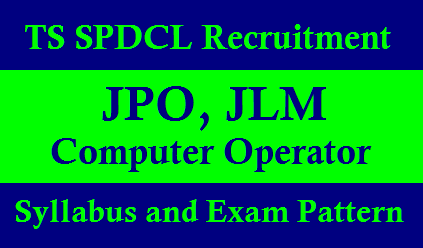TSSPDCL JAO,JPO and JLM Syllabus Downlaod
SYLLABUS FOR DIRECT RECRUITMENT OF JUNIOR PERSONNEL OFFICER IN
TSSPDCL JAO Syllabus Downlaod: Telangana State Southern Power Distribution Company Limited TSSPDCL Recruitment has scheduled for the 2939 vacancies for various posts like Junior Lineman, Junior Personeel Officer JPO and Junior Assistant Cum Operator JAO posts . Total 3 Recruitment Notifications are scheduled to release in the month of October.
Interested candidates can download the TSSPDCL JAO syllabus 2019 from the below pdf document and start the preparation for Telangana upcoming jobs 2019 . The early preparation gives you a better understanding of the TSSPDCL JAO Exam Pattern.
SYLLABUS FOR DIRECT RECRUITMENT OF JUNIOR PERSONNEL OFFICER IN
TSNPDCL
SCHEME OF EXAMINATION
Section A: Written Examination (Objective Type): Human Resource Management, Industrial Laws, General Laws & Labour Laws etc. - 60 Marks
Section:B: Comprehension, Mental Ability, Numerical & Arithmetic Ability and General awareness - 40 Marks
SECTION – A: (ENGLISH AND TELEGU)
1. Fundamentals of HR Management
o HR Management: Concepts and Challenges
o Human Resource Development
o Line Management in HR
o HR Policies and Practices
o Designing HR Systems
2. Industrial Relations
o Fundamentals of Industrial Relations
o Conflict Management
o Collective Bargaining and Negotiations Process o Grievance Management
o Employers/Management
o Contemporary Issues in Industrial Relations o Trade Unions
3. General Laws:
o Constitution of India
o Broad Framework of the Constitution of India: Fundamental Rights, Directive Principles of State Policy
o Ordinance Making Powers of the President and the Governors Legislative Powers of the Union and the States
o Freedom of Trade, Commerce and Intercourse
o Constitutional Provisions relating to State Monopoly
o Judiciary, Writ Jurisdiction of High Courts and the Supreme Court
o Different Types of Writs - Habeas Corpus, Mandamus, Prohibition, Quo Warranto and Certiorari
o Concept of Delegated Legislation
4. Right to Information Act, 2005
5. Labour Laws
6. Factories Act, 1948
7. Minimum Wages Act, 1948
8. Payment of Wages Act, 1936
9. Equal Remuneration Act, 1976
10. Employees’ State Insurance Act, 1948
11. Employees’ Provident Funds and Miscellaneous Provisions Act, 1952
12. Payment of Gratuity Act, 1972
13. Workmen’s Compensation Act, 1923
14. Maternity Benefit Act,1961
15. Industrial Employment (Standing Orders) Act, 1946
16. Industrial Disputes Act, 1947
17. Indian Trade Union Act, 1926
18. The Labour Laws (Exemption from Furnishing Returns and Maintaining Register by Certain Establishments) Act, 1988
19. Employment Exchanges (Compulsory Notification of Vacancies) Act, 1959 .
SECTION – B: 40 Marks
1. English Language (Comprehension, passages & re-arrangement of sentences, Synonyms & Antonyms)
2. General Awareness, Logical Reasoning and Numerical ability:
i) Analytical &Numerical Ability
ii) Logical Reasoning
iii) Decision making and problem solving
iv) Computer Applications & Skills.
v) General Awareness (current events of National & International importance)
vi) Telangana Movement & State formation
- The idea of Telangana (1948 to 1970)
- Mobilizational phase (1971 – 1990)
- Towards formation of Telangana State (1991-2014)
SYLLABUS FOR THE POST OF JLM IN TSSPDCL
SCHEME OF EXAMINATION
Paper
|
Subject
|
No. of Questions
|
Duration
|
Maximum
| ||
(Minutes)
|
Marks
| |||||
80 Questions
| ||||||
1.
|
I.T.I(Electrical Trade) and
|
(I.T.I(Electrical Trade):
|
120
|
80
| ||
General Knowledge
|
65 Questions and General
| |||||
Knowledge: 15 Questions)
| ||||||
Section-A:
|
65 Marks.
| |||||
I.T.I (Electrical Trade)
| ||||||
1. Fundamentals of electricity: Electrical occupational safety, tools, Ohms law, Kirchoffs law, series, parallel, Kirchoffs law and star delta, problems – Electrostatics and capacitors. Earthing principles and methods of earthing
2. Batteries: primary and secondary, lead acid cells, methods of charging - testing and application of batteries, invertors, battery chargers and maintenance
3. Magnetism: Magnetic materials and properties laws of magnetism electromagnetism, electromagnetic induction
4. Fundamentals of AC: Simple problems of AC fundamentals, power, power factor, single phase and three phase circuits
5. Basic Electronics: Electronic components, rectifiers, amplifiers, oscillators and power electronic components
6. DC Machines: construction, working principle and simple problems on DC generators and motors, speed control and applications of DC motors – windings
7. Transformers: construction, working principle, basic concepts and simple problems on transformers – windings – auto transformers, power transformers, CT & PT
8. AC Machines: basic concepts, construction principle and simple problems on three phase and single phase induction motor, universal motor, alternators, synchronous motors and their applications and windings - concept of power electronic drives
9. Electrical measurements –Different types of AC and DC measuring instruments, Domestic appliances and Illumination concepts - types of electric lamps
10. Electric Power generation- thermal, hydal and nuclear, transmission and distribution system – basic concepts, non-conventional energy sources.
SectionB: 15 Marks.
GENERAL KNOWLEDGE
1. Current affairs.
2. International Relations and Events.
3. General Science in everyday life.
4. Environmental Issues and Disaster Management.
5. Geography and Economy of India and Telangana.
6. Indian Constitution: Salient Features.
7. Indian Political System and Government.
8. Modern Indian History with a focus on Indian National Movement.
9. History of Telangana and Telangana Movement.
10. Society, Culture, Heritage, Arts and Literature of Telangana.
11. Policies of Telangana State.












